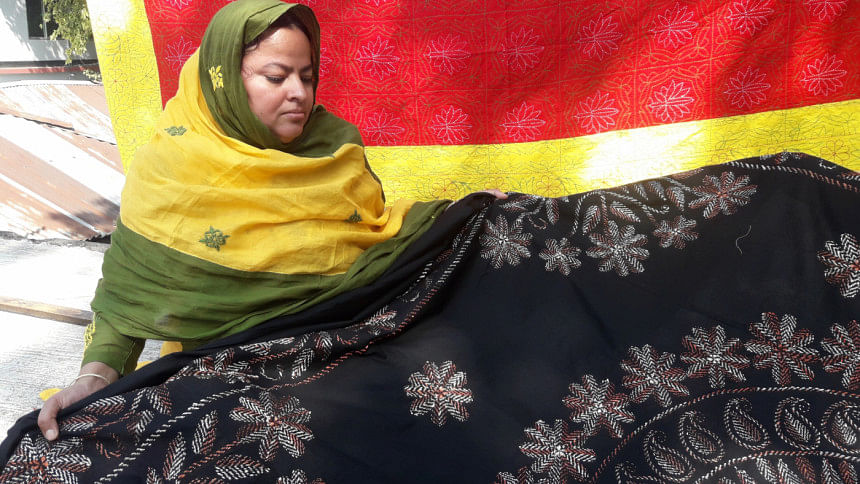Decorating lives with Nakshi Kantha

In the face of extreme poverty after marriage in 2001, Salma Khatun did not just sit back. Capitalising on her drawing skills, she started making Nakshi Kantha, hand-crafted traditional embroidered quilt, for a living.
With years of hard work and her husband, unemployed at the time, on her side, her quilt shop started paying dividends.
About 19 years later, poverty is a thing of the past for Salma and now she owns a single storey building, constructed with the earnings from her shop, named Nakshi Polli, in Adarshapara area of Jhenidah town.
Nakshi Polli is now not only a place of business, but a place of hope for women in the neighbourhood. Over 50 women now depend on the shop for some additional cash for their households.
Out of four rooms in the house, Salma designated two rooms for her shop. She lives with her husband and two young children, three and five years of age, in two other rooms.
Homemaker women usually work at the shop in their spare time, while some schoolgirls, as many as 10, also work there after school hours or on weekends only.
The schoolgirls said they find the work enjoyable and a way of earning their own pocket money without affecting their studies.
While visiting Nakshi Polli, Salma said aside from different sizes of Nakshi Kantha for different purposes, regular quilts and bed covers are also made in her shop.
During the dry season, the roof of her house is turned into a makeshift shop where the women enjoy the sun while having casual conversation with each other.
She also makes an additional income from sketching decorative designs on Nakshi Kantha or on various other embroidery items brought to her by people from nearby areas. She charges Tk 100 to Tk 200 for each item, depending on size and design.
She now makes around Tk 50,000 from the shop where nearly 10 Nakshi Kantha, 20 regular quilts, 15 bed covers and 100 Nakshi Kantha for children are made each month, Salma said.
To make an average Nakshi Kantha, of eight feet by five and a half feet size, 13 yards of white plain cloth, three saris and silk threads are used. At least three signature pens are also used to draw designs on the materials.
Her husband Jahid Hossain helps her by procuring the raw materials from local markets, she said, adding that he buys the saris from Poradah in Kushtia.
The lowest price of the smallest Kantha sells for Tk 200 while the largest one for as much as Tk 5,000.
She said it was not just her knack for drawing that helped her succeed. in 2017, she also got a one-month training on block and boutique works from Department of Women Affairs in Jhenidah and in 2018, she got a two-month training on Nakshi Kantha stitch works from Mohila Shangstha, a non-governmental organisation in the town.
Buyers for her products come to Jhenidah from all around the country and she sends out the products via courier services too, Salma added.

 For all latest news, follow The Daily Star's Google News channel.
For all latest news, follow The Daily Star's Google News channel. 



Comments